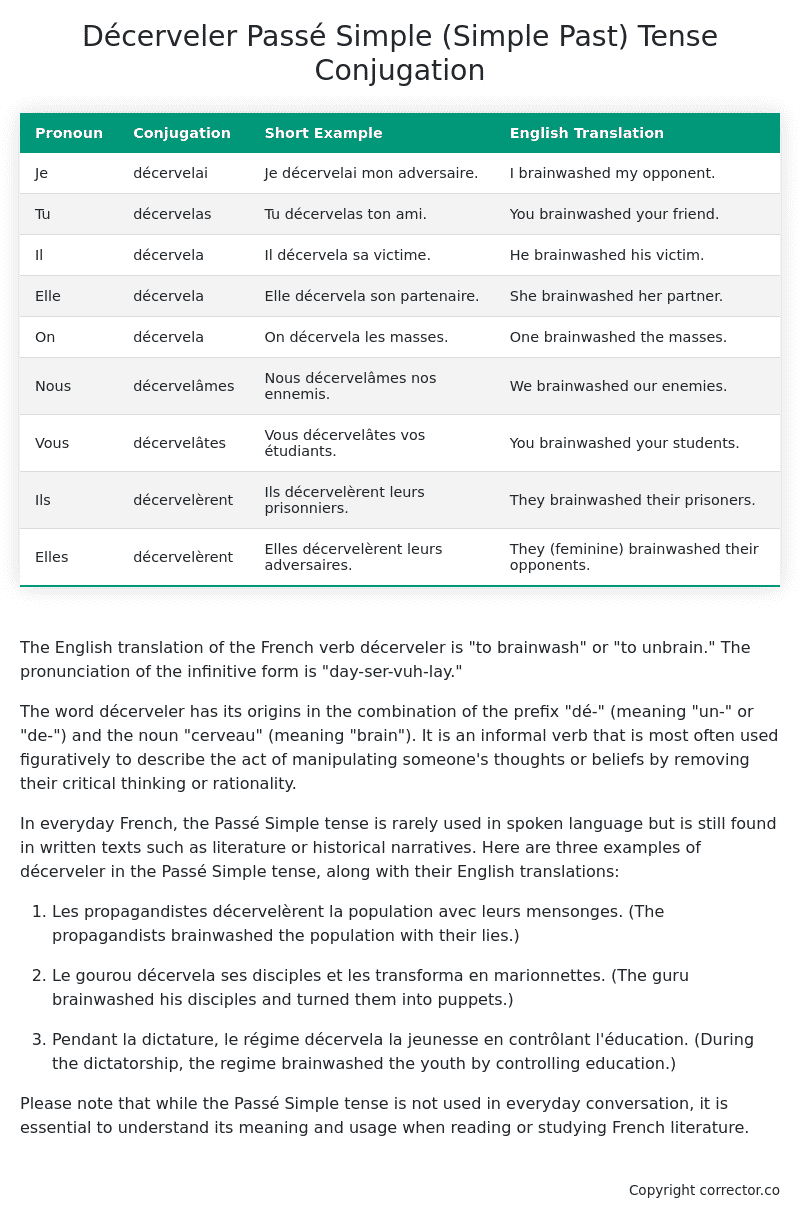Passé Simple (Simple Past) Tense Conjugation of the French Verb décerveler
Introduction to the verb décerveler
The English translation of the French verb décerveler is “to brainwash” or “to unbrain.” The pronunciation of the infinitive form is “day-ser-vuh-lay.”
The word décerveler has its origins in the combination of the prefix “dé-” (meaning “un-” or “de-“) and the noun “cerveau” (meaning “brain”). It is an informal verb that is most often used figuratively to describe the act of manipulating someone’s thoughts or beliefs by removing their critical thinking or rationality.
In everyday French, the Passé Simple tense is rarely used in spoken language but is still found in written texts such as literature or historical narratives. Here are three examples of décerveler in the Passé Simple tense, along with their English translations:
-
Les propagandistes décervelèrent la population avec leurs mensonges.
(The propagandists brainwashed the population with their lies.) -
Le gourou décervela ses disciples et les transforma en marionnettes.
(The guru brainwashed his disciples and turned them into puppets.) -
Pendant la dictature, le régime décervela la jeunesse en contrôlant l’éducation.
(During the dictatorship, the regime brainwashed the youth by controlling education.)
Please note that while the Passé Simple tense is not used in everyday conversation, it is essential to understand its meaning and usage when reading or studying French literature.
Table of the Passé Simple (Simple Past) Tense Conjugation of décerveler
| Pronoun | Conjugation | Short Example | English Translation |
|---|---|---|---|
| Je | décervelai | Je décervelai mon adversaire. | I brainwashed my opponent. |
| Tu | décervelas | Tu décervelas ton ami. | You brainwashed your friend. |
| Il | décervela | Il décervela sa victime. | He brainwashed his victim. |
| Elle | décervela | Elle décervela son partenaire. | She brainwashed her partner. |
| On | décervela | On décervela les masses. | One brainwashed the masses. |
| Nous | décervelâmes | Nous décervelâmes nos ennemis. | We brainwashed our enemies. |
| Vous | décervelâtes | Vous décervelâtes vos étudiants. | You brainwashed your students. |
| Ils | décervelèrent | Ils décervelèrent leurs prisonniers. | They brainwashed their prisoners. |
| Elles | décervelèrent | Elles décervelèrent leurs adversaires. | They (feminine) brainwashed their opponents. |
Other Conjugations for Décerveler.
Le Present (Present Tense) Conjugation of the French Verb décerveler
Imparfait (Imperfect) Tense Conjugation of the French Verb décerveler
Passé Simple (Simple Past) Tense Conjugation of the French Verb décerveler (You’re reading it right now!)
Passé Composé (Present Perfect) Tense Conjugation of the French Verb décerveler
Futur Simple (Simple Future) Tense Conjugation of the French Verb décerveler
Futur Proche (Near Future) Tense Conjugation of the French Verb décerveler
Plus-que-parfait (Pluperfect) Tense Conjugation of the French Verb décerveler
Passé Antérieur (Past Anterior) Tense Conjugation of the French Verb décerveler
Futur Antérieur (Future Anterior) Tense Conjugation of the French Verb décerveler
Subjonctif Présent (Subjunctive Present) Tense Conjugation of the French Verb décerveler
Subjonctif Passé (Subjunctive Past) Tense Conjugation of the French Verb décerveler
Subjonctif Imparfait (Subjunctive Imperfect) Tense Conjugation of the French Verb décerveler
Subjonctif Plus-que-parfait (Subjunctive Pluperfect) Tense Conjugation of the French Verb décerveler
Conditionnel Présent (Conditional Present) Tense Conjugation of the French Verb décerveler
Conditionnel Passé (Conditional Past) Tense Conjugation of the French Verb décerveler
Conditionnel Passé II (Conditional Past II) Tense Conjugation of the French Verb décerveler
L’impératif Présent (Imperative Present) Tense Conjugation of the French Verb décerveler
L’impératif Passé (Imperative Past) Tense Conjugation of the French Verb décerveler
L’infinitif Présent (Infinitive Present) Tense Conjugation of the French Verb décerveler
L’infinitif Passé (Infinitive Past) Tense Conjugation of the French Verb décerveler
Le Participe Présent (Present Participle) Tense Conjugation of the French Verb décerveler
Le Participe Passé (Past Participle) Tense Conjugation of the French Verb décerveler
Struggling with French verbs or the language in general? Why not use our free French Grammar Checker – no registration required!
Get a FREE Download Study Sheet of this Conjugation 🔥
Simply right click the image below, click “save image” and get your free reference for the décerveler Passé Simple tense conjugation!

Décerveler – About the French Passé Simple (Simple Past) Tense
Formation
Usage
Narration
Historical Context
Interactions with other tenses
Passé Composé
Imparfait
Conditional and Subjunctive
Summary
I hope you enjoyed this article on the verb décerveler. Still in a learning mood? Check out another TOTALLY random French verb conjugation!


